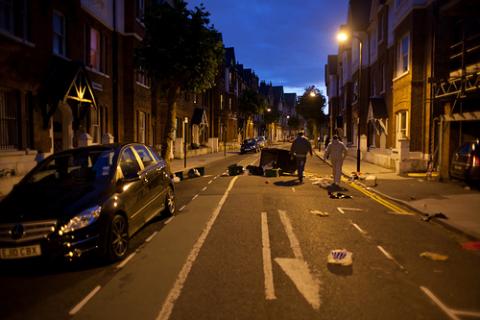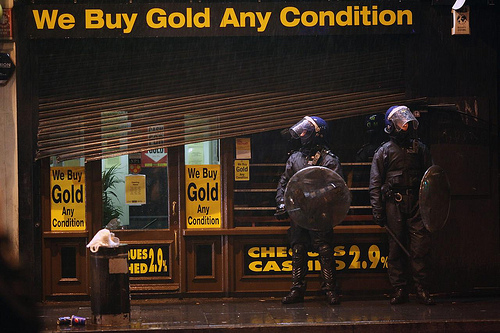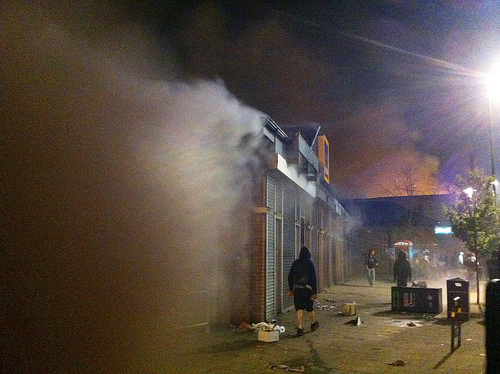London: Neoliberal riots and the possibility of politics

The details of how and why the public sphere has been systematically looted may not be very clear to Britain's rioters, but they feel its effects. Their lives are looted. They have nothing to lose. By William Wall.
One of the many things that we hear repeated ad nauseam in the context of the present rioting in London is that the rioters are ‘feral’, ‘yobs’, ‘thugs’ or more generously ‘disaffected youth’. All the talk from Cameron and his cohorts is of crime and punishment and ‘the full force of the law’ – as if these young people did not encounter the full force of the law on a daily basis. We are told variously that there is no political context, no political motive, no political enemy – it is ‘criminality pure and simple’. This is because violence against the police (and therefore the state) is not considered in itself to be political. It is because the envy of, the desire for and the acquisition of luxury goods such as plasma TVs and jewellery is not considered political. The political class and the commentariat cannot conceive of themselves as enemies of the people who live in areas like Tottenham, where Tory cuts are closing youth centres; which suffer massive unemployment even while the City is booming; and which are the objects of legislation designed to disadvantage them even further.
On the other hand, the neoliberal state functions primarily as a way of facilitating the accumulation of wealth and hence luxury goods. The purpose of the state, neoliberal theory tells us, is to enable business and industry to function profitably and to this end it must undertake certain activities that business and industry cannot reasonably be expected to make a profit from – road building, for example, or providing a police force – although, as profit margins shrink and markets are flooded by competitors, even these sacred state functions are being ‘de-regulated’ or privatised to allow for profit-making companies to take them over. The proposed privatisation of the prison-service is an example, as is the continuous drive to open education up to exploitation by computer companies. It’s hardly worth mentioning the crazy argument that the NHS in the UK is ‘broken’ and the Tory programme of opening it up to supposedly cheaper and more efficient profit-making companies – despite the fact that all the studies show that the NHS is the most efficient and cost-effective way of delivering health care.
So capitalism is looting the public sphere. Services that citizens have for a hundred or more years considered to be public goods and not to be exploited for the profit of a few – health care, care of the elderly, education, unemployment benefit, old-age pensions, fresh water, sewers, waste disposal, roads and footpaths, urban and rural planning, the postal service, the telephone service, the police, and so on – are subject to systematic and sustained pressure aimed at breaking the link between the citizen and the service. No longer should we think of these things as ‘ours’, except in the sense that we can say a bank is ours. These things are provided to us as goods and services by companies which exercise their right to make a profit out of them – out of us really; out of our pain, our parents’ old age, our children’s childhoods, our money troubles, our environment. Citizens are to be redefined as consumers of services. The sole function of the state is to regulate the activities of companies so that monopolies do not develop.
The police function as the guarantor of profit. The police are ‘ours’ only in the way the taxman is ours. The police thus find themselves increasingly (for it was ever thus) with their backs to the corporate wall facing a disinherited citizenry for whom the state is a hostile force. This makes the police political - for it is a mistake to think that the looting of the public sphere by corporations and individuals is not political. Of course, nobody on the corporation side wants to call it that. They want it to be understood as common sense. The state is ‘broken’, they say, or it has ‘failed’. Only profit-making companies can do the job efficiently and give good value for money to the consumer. What they really mean is ‘We’re going to take the money and run.’ When you’re down and out, feeling low, check your credit rating.

At a time when the gap between the rich and the poor is at an historic high, higher than it was in the nineteenth century when capitalism was at its peak, is it any surprise that unemployed young men from Tottenham, Hackney, Clapham or Peckham have learned these lessons well? In the event of the breakdown of the state, keep your eye on the main chance. Gold is at an all-time high now, it’s where all the smart investors are going. They take their money and run. There’s always a market for cool TVs, especially with the Olympics coming up – just up the road from Tottenham as it happens. If you’re not in you can’t win. So get in there and take what you can. In the end it’s just business. From MacDonald’s to the ‘payday loans’ and ‘we buy gold’ companies that advertise all over East and South London, the message is clear: ‘The only value we place on you is your ability to pay. Anyone who can’t afford to pay is a scrounger, a scum, a chavvy bastard, a parasite.’
In this world the police are just another form of violence – look at what they did to the anti-cuts marchers. They are the state’s weapon of choice for disciplining disaffected youth, for criminalising dissent and for protecting profit. They’re not playing the latter role very effectively in London at present, but they’ve worked hard at the others, which are easier picking. The recent jail sentence of 16 months for Charlie Gilmour for supposedly violent acts during the recent anti-cuts protest - the worst of which acts seem to have involved throwing a dustbin at Prince Charles’s Rolls Royce and swinging from a flagstaff, contrasts sharply with the fact that no policeman has ever been convicted for the death in custody of a black person. The shooting dead of a black man in a mini-cab in Ferry Lane, Tottenham is all of a piece with this repressive function. We now know that there is no evidence to support the police alibi that Mark Duggan fired first. Whether or not he was a gangster, as the police believed, the fact is they would never have shot a bank director. Nevertheless, the banker is the obverse of the coin that has Mark Duggan’s face on it. The closure of three-quarters of the youth centres in Tottenham by the present Tory government is directly linked to the supposed stability of the UK economy. The price of the banker’s home is paid by the young citizens of North and South London. On Wednesday, on RTÉ’s Liveline programme, I heard a man who lived in London describe the rioters as ‘shopping with our money’. That works both ways. The banker shops with money that should have gone to the communities of Tottenham, Clapham, Hackney …

That the rioters have only tentatively made that connection is not their fault. If I were the Tory government and their criers-in I would dread the day that the disaffected youth makes a more accurate assessment of their oppressor, when they will move on from the enemy in their face (the police) to the enemy behind the one-way windows and ‘iconic’ buildings. That they have repeatedly targeted the big multinational chains – Topshop, Hugo Boss, MacDonald’s, Sony, and Carpetright (Chairman Lord Harris of Peckham, Conservative Party donor and Member of the House of Lords), and that there have been ‘disturbances’ in Oxford Street is significant. In the meantime they live the poor kid’s version of the neoliberal dream: shopping ‘with our money’ in all the best places, bringing home the latest in sports shoes, technology and that best of all investments, gold.
There is nothing mindless about this violence. It is intelligent, technological and well-organised. Tactically, the rioters have outfoxed the much stronger police force and the intelligence services. It is destructive of community life, certainly; brutally hard on small shopkeepers and people living on or near the high streets; but so is permanent unemployment, hopelessness and the conviction that the state has abandoned you in favour of the Stock Exchange. That these young people have turned on the most immediate symbols of power and wealth and that they want some of it for themselves makes these riots no worse than the destruction undertaken by Thatcher or beginning under Cameron. And they are quintessentially neoliberal because these young people have absorbed the dictum that greed is good, that you take what you can, that the powerful shall inherit the earth.
Buried in there, under all the false consciousness, there is still a measure of anger deriving from the increasing humiliation of themselves and their parents and their communities. It is accompanied by a certainty that the toffs of the Tory party, the owners of multinational corporations, and the police are their enemies. The structure of the thing may not be very clear to them, but they feel its effects. Their lives are looted. They have nothing to lose.
But if this brave and powerful speaker from Hackney has her way they may find a better analysis. ‘Get real black people,’ she says, ‘if we’re fighting for a fucking cause we’re fighting for a fucking cause.’ She knows that the riots are political, but it’s the wrong politics at the moment. They’re fighting for the wrong cause. Writer Darcus Howe says so too (this video may be taken down by Youtube, so share if you can) but, with more experience, he calls it an insurrection.
This content is published under the Attribution-Noncommercial-No Derivative Works 3.0 Unported license.
Image top: Zaykosi.
Images middle, bottom: Beacon Radio.
{jathumbnailoff}
